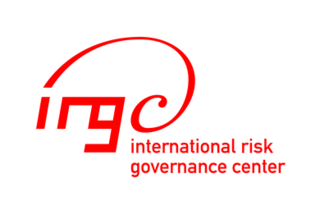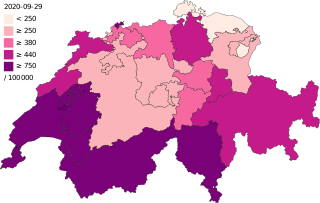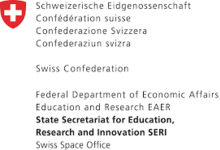
The European Space Agency (ESA) is a 22-member intergovernmental body devoted to space exploration. With its headquarters in Paris and a staff of around 2,200 people globally as of 2018, ESA was founded in 1975. Its 2023 annual budget was €7.08 billion.

Switzerland, officially the Swiss Confederation, is a landlocked country located at the confluence of Western, Central and Southern Europe. It is bordered by Italy to the south, France to the west, Germany to the north and Austria and Liechtenstein to the east. Switzerland is geographically divided among the Swiss Plateau, the Alps and the Jura; the Alps occupy the greater part of the territory, whereas most of the country's population of 9 million are concentrated on the plateau, which hosts the largest cities and economic centres, including Zürich, Geneva and Basel.

Spacelab was a reusable laboratory developed by European Space Agency (ESA) and used on certain spaceflights flown by the Space Shuttle. The laboratory comprised multiple components, including a pressurized module, an unpressurized carrier, and other related hardware housed in the Shuttle's cargo bay. The components were arranged in various configurations to meet the needs of each spaceflight.

Ulf Dietrich Merbold is a German physicist and astronaut who flew to space three times, becoming the first West German citizen in space and the first non-American to fly on a NASA spacecraft. Merbold flew on two Space Shuttle missions and on a Russian mission to the space station Mir, spending a total of 49 days in space.

The Federal Department of Foreign Affairs, so named since 1979, is one of the seven Departments of the Swiss government federal administration of Switzerland, and corresponds in its range of tasks to the ministry of foreign affairs in other countries. The department is always headed by one of the members of the Swiss Federal Council. Since 1 November 2017, the department is headed by Federal Councillor Ignazio Cassis.

Umberto Guidoni is an Italian astrophysicist, science writer and a former ESA astronaut, being the first European to visit the International Space Station. He is a veteran of two NASA Space Shuttle missions. He was also a Member of the European Parliament (MEP) from 2004 to 2009, with the Group of the European United Left (GUE/NGL).

Claude Nicollier is the first astronaut from Switzerland. He has flown on four Space Shuttle missions. His first spaceflight (STS-46) was in 1992, and his final spaceflight (STS-103) was in 1999. He took part in two servicing missions to the Hubble Space Telescope. During his final spaceflight he participated in a spacewalk, becoming the first European Space Agency astronaut to do so during a Space Shuttle mission. In 2000 he was assigned to the Astronaut Office Extravehicular Activity Branch, while maintaining a position as Lead ESA Astronaut in Houston. Nicollier retired from ESA in April 2007.

Wubbo Johannes Ockels was a Dutch physicist and astronaut with the European Space Agency who, in 1985, became the first Dutch citizen in space when he flew on STS-61-A as a payload specialist. He later became professor of aerospace engineering at Delft University of Technology.

Gerhard Paul Julius Thiele is a German physicist and a former ESA astronaut. He is the father of Die Astronautin candidate Insa Thiele-Eich.

The International Risk Governance Center (IRGC) is a neutral interdisciplinary center based at the École Polytechnique Fédérale de Lausanne (EPFL) in Lausanne, Switzerland. IRGC develops risk governance strategies that focus on involving all key stakeholder groups, including citizens, governments, businesses and academia. It exists to improve the understanding, management and governance of emerging and systemic risks that may have significant adverse consequences for human health and the environment, the economy and society. Its mission includes "developing concepts of risk governance, anticipating major risk issues and providing risk governance policy advice for key decision-makers."

Thomas Arthur Reiter is a retired European astronaut and is a Brigadier General in the German Air Force currently working as ESA Interagency Coordinator and Advisor to the Director General at the European Space Agency (ESA). He was one of the top 25 astronauts in terms of total time in space. With his wife and two sons he lives near Oldenburg in Lower Saxony.

Major Paolo Angelo Nespoli is an Italian astronaut and engineer of the European Space Agency (ESA). In 2007, he first traveled into space aboard the Space Shuttle Discovery as a mission specialist of STS-120. In December 2010 he again traveled into space aboard the Soyuz TMA-20 spacecraft as an Expedition 26/27 flight engineer. Nespoli's third spaceflight was on board Soyuz MS-05, which launched in July 2017 for Expedition 52/53. He was also the European Space Agency's oldest active astronaut prior to his retirement in 2019.
The European Astronaut Corps is a unit of the European Space Agency (ESA) that selects, trains, and provides astronauts as crew members on U.S. and Russian space missions. The corps has 13 active members, able to serve on the International Space Station (ISS). The European Astronaut Corps is based at the European Astronaut Centre in Cologne, Germany. They can be assigned to various projects both in Europe or elsewhere in the world, at NASA Johnson Space Center or Star City.

Crime in Switzerland is combated mainly by cantonal police. The Federal Office of Police investigates organised crime, money laundering and terrorism.
SWI swissinfo.ch is a multilingual international news and information company based in Bern Switzerland. It is a part of the Swiss Broadcasting Corporation. Its content is Swiss-centred, with top priority given to in-depth information on politics, the economy, the arts, science, education, and direct democracy. Switzerland's international political, economic and cultural relations are other key points of focus. The website is available in ten languages.

Science and technology in Switzerland play an important role in the Swiss economy, which has very few natural resources that are available in the country. The Swiss National Science Foundation, mandated by the Federal government, is the most important institute for promoting scientific research.

NASA Astronaut Group 9 was a group of 19 NASA astronauts announced on May 29, 1980, and completed their training by 1981. This group was selected to supplement the 35 astronauts that had been selected in 1978, and marked the first time that non-Americans were trained as mission specialists with the selections of ESA astronauts Claude Nicollier and Wubbo Ockels. In keeping with the previous group, astronaut candidates were divided into pilots and mission specialists, with eight pilots, eleven mission specialists, and two international mission specialists within the group.

The State Secretariat for Education, Research and Innovation (SERI) within the Federal Department of Economic Affairs, Education and Research is the federal government's specialised agency for national and international matters concerning education, research and innovation policy.

The COVID-19 pandemic in Switzerland is part of the worldwide pandemic of coronavirus disease 2019 caused by severe acute respiratory syndrome coronavirus 2. The virus was confirmed to have spread to Switzerland on 25 February 2020 when the first case of COVID-19 was confirmed following a COVID-19 pandemic in Italy. A 70-year-old man in the Italian-speaking canton of Ticino which borders Italy, tested positive for SARS-CoV-2. The man had previously visited Milan. Afterwards, multiple cases related to the Italy clusters were discovered in multiple cantons, including Basel-City, Zürich, and Graubünden. Multiple isolated cases not related to the Italy clusters were also subsequently confirmed.



















